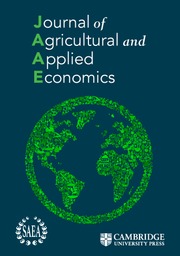Article contents
Measuring Inefficiency in the Presence of an Export Tax, an Import Tariff, and a State Trading Enterprise
Published online by Cambridge University Press: 28 April 2015
Abstract
Agricultural sales cooperative unions (ASCUs) in Turkey are heavily influenced by both domestic and international government policies. Both export taxes and import tariffs are used as policy tools to regulate cotton markets. Domestic price support programs, water subsidies, fertilizer subsidies, and credit subsidies have also been used as domestic policy tools. These types of subsidies are not uncommon among developing countries. This paper provides empirical estimates of the degree of economic inefficiency associated with government intervention in Turkish cotton markets. A two-region partial equilibrium model of cotton exports and imports is developed under the “small country assumption” to obtain empirical estimates of the deadweight welfare loss associated with these government subsidies. Although government intervention results in significant income distribution among the various cotton sectors within Turkey, the overall economic inefficiency of the redistribution is very low.
Keywords
- Type
- Original Articles
- Information
- Copyright
- Copyright © Southern Agricultural Economics Association 2002
References
- 2
- Cited by




